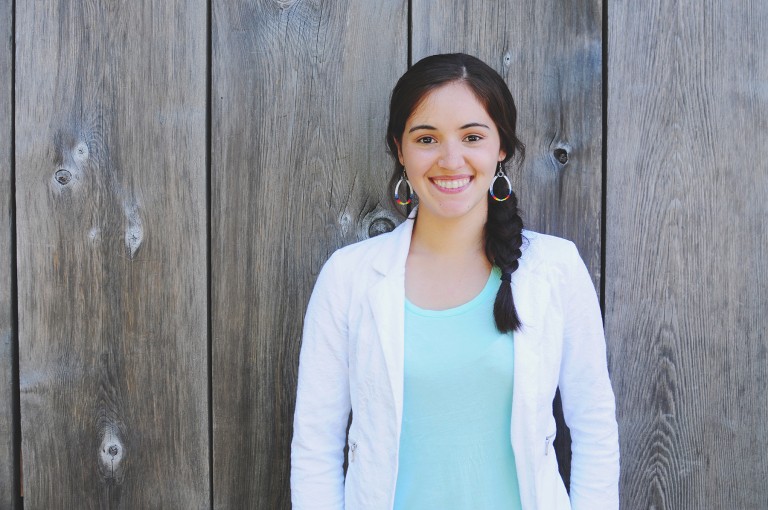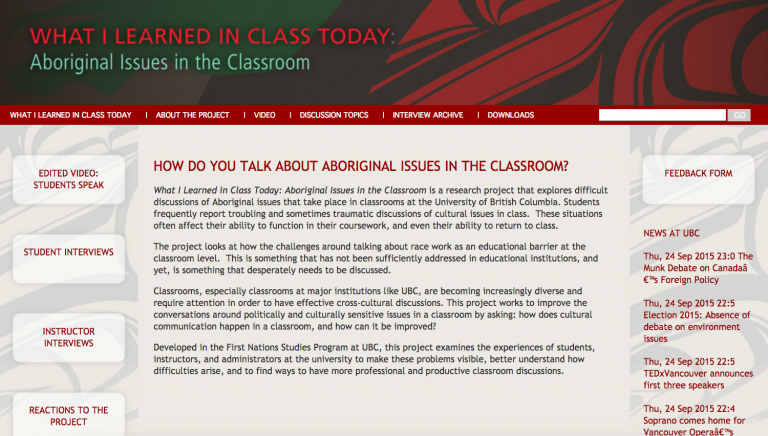The Aboriginal Initiatives Team is excited to once again be partnering with the First Nations and Indigenous Studies Program to host a research practicum student. Fourth-year FNIS major, Rebecca Doughty, has been working since the fall with Aboriginal Initiatives on a “reboot” of What I Learned In Class Today. This spring, Rebecca will be conducting interviews with Aboriginal students and alumni on their experiences in the classroom. She is scheduled to present her research findings at CTLT on Tuesday, March 23 at 1PM.

“I think there are pervasive misconceptions, misunderstandings, and sometimes arrogance surrounding Indigenous topics that can make it difficult for Aboriginal students to have meaningful and respectful conversations in the classroom. However, I know there are also many people who are working hard to better these situations. I really appreciate how this project is able to reach a range of people and speak many truths about the experiences of Aboriginal students.”
-First Nations and Indigenous Studies major and Aboriginal Initiatives Practicum Student Rebecca Doughty
Tell us a little about yourself.
My name is Rebecca and I am Kwakiutl and Squamish. I’m a fourth year major in the First Nations and Indigenous Studies Program (FNIS). I’m also the Vice President of the First Nations Studies Student Association.
What is your practicum project?
As part of the FNIS Research Practicum, I will be working with Aboriginal Initiatives: Centre for Teaching, Learning, and Technology (CTLT) to review the project “What I Learned in Class Today: Aboriginal Issues in the Classroom.” It has been ten years since this project was initially undertaken and I will be researching institutional changes in the past ten years that support Aboriginal students in the classroom. This will also include interviews with UBC Aboriginal students, aimed at bettering our understanding of their experiences through discussions of Aboriginal topics in the classroom. Through this, we hope to learn how Aboriginal students’ experiences have changed over the past ten years.
What aspects of “What I Learned in Class Today” speak to you as a current student at UBC?
I think that many of the discussions that were brought forward in “What I Learned in Class Today” are still relevant today. I remember when I first watched the video in one of my classes, I was surprised at how similar some of my experiences were to those of the students being interviewed. I think there are pervasive misconceptions, misunderstandings, and sometimes arrogance surrounding Indigenous topics that can make it difficult for Aboriginal students to have meaningful and respectful conversations in the classroom. However, I know there are also many people who are working hard to better these situations. I really appreciate how this project is able to reach a range of people and speak many truths about the experiences of Aboriginal students.
“I think my most positive experiences have been the ones where I was able to participate in and create spaces where I felt included as an Indigenous person and student.”

Rebecca will be working on a reboot of the instructional resource, What I Learned in Class Today.
What do you want faculty and staff to know about engaging with Indigenous students on campus?
I think that when it comes to engaging with Indigenous students, the value of respect should come first and foremost. Respect is possible when participants in a discussion are able to recognize each other’s differences and engage with each other in a way that is considerate of each person’s unique experiences and background. Secondly, the nurturing of cross-cultural understanding is also integral to this process. For me, achieving understanding can and should involve educating yourself on the topic, having an open mind, and creating meaningful dialogue. Fostering respect and understanding for Indigenous peoples is an ongoing and personal process that every faculty, staff, and student should continually strive towards.
What has been your most positive experience as a student at UBC?
It’s hard to pick just one. I think my most positive experiences have been the ones where I was able to participate in and create spaces where I felt included as an Indigenous person and student. These spaces were often found during a good class that spoke directly to who I am, conversations between myself and other students, faculty or staff that completely engaged me, and so on. I would also have to say that organizing and hosting the 2015 UBC Nehiyo-pasqua-itsimowan Pow-wow was such a positive and unforgettable experience that it stands out amongst my memories as a student. What stood out to me about this event was its ability to create cultural space within an institution like UBC and bring together such a variety of people to celebrate life through dance and song.
Tell us about something you are reading or recently read that surprised you/sparked your interest?
I have recently started to re-read Ceremony by Leslie Silko. What I like about this book is that it is different from a lot of the “academic” work we often read. It beautifully, painfully and truthfully addresses many topics discussed within Indigenous studies.

